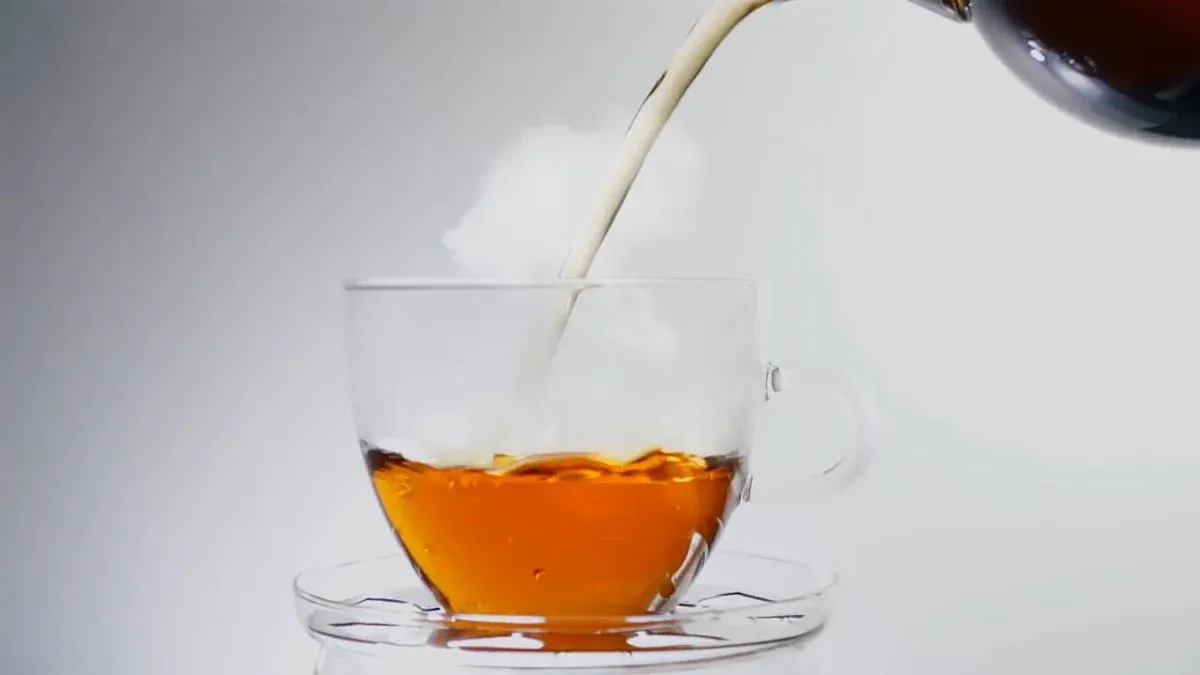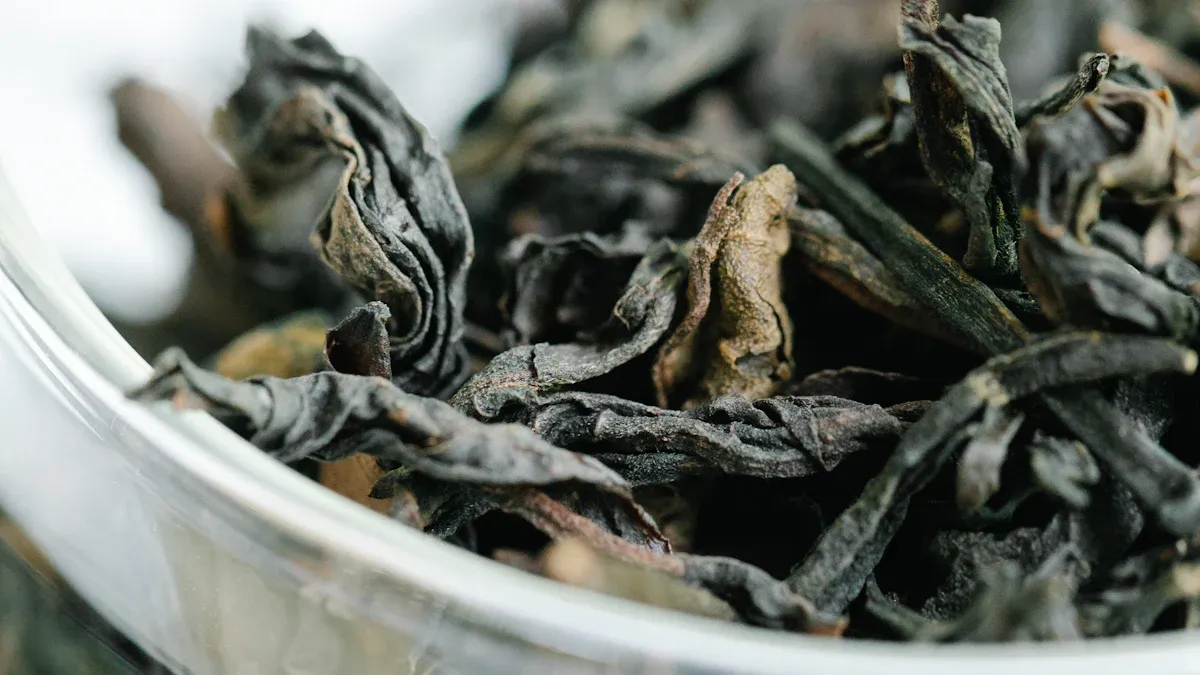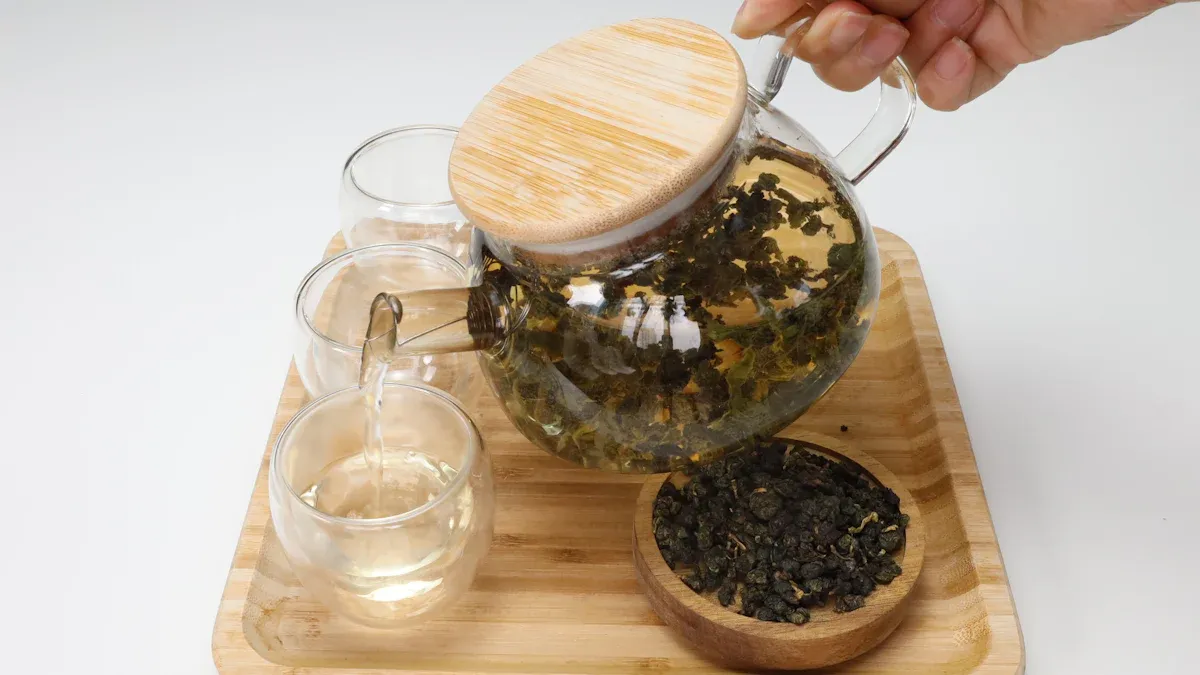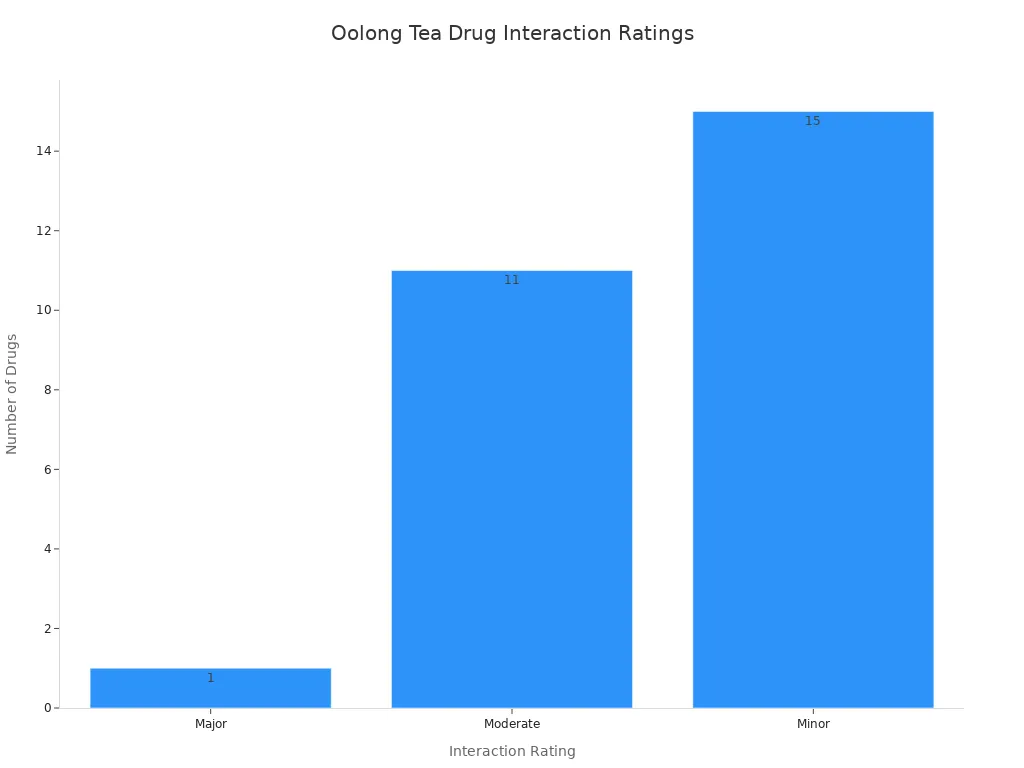
Oolong tea offers a fascinating middle ground between green and black varieties, and its popularity is soaring. The global market for this unique brew expects to reach nearly 600 million USD by 2032. You will learn how oolong tea enhances your metabolism, provides powerful antioxidants, and supports effective weight management. This post delves into the science behind these oolong tea benefits and offers practical ways to incorporate oolong tea into your daily life. Discover the remarkable health benefits of oolong tea for your overall well-being. Oolong tea truly holds immense potential. You can easily add oolong tea to your routine.
Key Takeaways
Oolong tea helps your body burn fat and calories. It boosts your metabolism and helps with weight loss.
Oolong tea has many antioxidants. These protect your body’s cells from damage and keep you healthy.
Oolong tea can make your heart healthier. It also helps your brain work better and keeps your bones strong.
You can drink 2-3 cups of oolong tea each day. This helps you get its health benefits.
Talk to your doctor if you have health problems. This is important before you drink oolong tea.
What Is Oolong Tea?

Oolong tea holds a special place in the world of tea. It is a unique type of tea that sits between green tea and black tea. You will find its characteristics are a blend of both.
Unique Processing
The way producers make oolong tea is very special. All true teas come from the Camellia sinensis plant. The processing steps determine the tea type. First, workers harvest the leaves. Then, they spread them out to wither. This step makes the leaves soft and removes moisture. Next, they roll or bruise the leaves. This breaks down cell walls and starts oxidation. Oxidation happens when leaves touch air. This process creates flavor compounds. For green tea, oxidation is almost non-existent. Black tea undergoes full oxidation. Oolong tea falls in the middle. It is partially oxidized, ranging from 10% to 80%. This partial oxidation gives oolong tea its unique chemical makeup. It reduces bitter compounds. It also increases many volatile compounds. These compounds give oolong tea its floral aroma. Finally, heat drying stops the oxidation. This step also dries the leaves and adds more flavor.
Here is a quick look at how different teas compare:
Feature | Green Tea | Oolong Tea | Black Tea |
|---|---|---|---|
Oxidation Level | Unoxidized (0%) | Partially oxidized (10%-80%) | Fully oxidized (100%) |
Flavor Profile | Fresh, grassy, umami-rich | Floral, nutty, roasted, fruity, diverse | Bold, malty, earthy |
Flavor and Varieties
Oolong tea offers a wide range of flavors. Its partial oxidation creates this diversity. You can find oolong tea that tastes vegetal, like fresh greens. Other types of oolong tea have floral notes. Some oolong tea tastes fruity, sweet, or nutty. You might even find creamy, earthy, or smoky flavors. Lightly oxidized oolong tea often has fresh, floral notes. Heavily oxidized oolong tea can have deeper, roasted, or mineral tastes. This wide spectrum makes oolong tea a fascinating drink to explore.
Oolong Tea and Metabolism for Weight Loss
Oolong tea offers significant oolong tea benefits for your body’s metabolism and can play a key role in weight loss. You can understand how this unique tea helps you manage your weight by looking at its effects on fat burning, energy use, and gut health.
Fat Oxidation
Fat oxidation is your body’s process of burning fat for energy. Oolong tea actively helps you burn more fat. Its polyphenols and caffeine can inhibit pancreatic lipase, an enzyme that breaks down fats. This means your body absorbs less fat, potentially reducing fat absorption by up to 9%. These compounds also promote greater fat oxidation, especially during exercise.
Studies show that drinking oolong tea significantly increases your body’s ability to burn fat. For example, a 2001 study found that full-strength oolong tea increased fat oxidation by 12% compared to just drinking water. More recently, a 2020 study observed that oolong tea increased fat oxidation by about 20% over 24 hours in non-obese males. This study also noted that oolong tea led to a greater decrease in respiratory quotient during sleep, showing its strong effect on fat burning even when you rest. You can see how oolong tea helps your body use fat more efficiently.
Energy Expenditure
Energy expenditure refers to the total number of calories your body burns. Oolong tea can help you boost metabolism, increasing how many calories you burn each day. The catechins in oolong tea, like EGCG (also found in green tea), are responsible for this. EGCG triggers your body’s internal thermogenesis switch. This process helps your body heat up and use fat for energy. Catechins increase the concentration of free fatty acids in your blood, which encourages your body to use fat as an energy source.
One study in the Journal of Nutrition showed that drinking oolong tea for three days led to a 2.9% increase in energy expenditure. This effect was particularly noticeable in lean individuals. This means you burn more calories, even at rest, which contributes to overall weight loss.
Gut Health Impact
Your gut health plays a crucial role in your overall metabolism and weight loss efforts. Oolong tea can positively influence your gut microbiota, the community of bacteria in your intestines. A 3-week intake of oolong tea significantly changes your gut microbial diversity. It increases beneficial bacteria like Bacteroides and Prevotella. It also decreases the abundance of Megamonas.
Oolong tea polyphenols (OTP) help regulate your gut microbiota composition. They can increase beneficial bacteria like Akkermansia and Muribaculum, while decreasing harmful ones like Desulfovibrio. This improved gut environment helps your body process food better and can reduce adipocyte size and visceral fat. By supporting a healthy gut, oolong tea indirectly aids in managing your weight.
Aiding Weight Loss
Combining these effects, oolong tea provides comprehensive support for weight loss. It helps decrease body fat, boosts your metabolism, and burns fat more effectively. Clinical evidence strongly supports these oolong tea benefits.
A study involving 102 overweight or obese subjects found that drinking 8g of oolong tea daily for 6 weeks led to significant reductions in body weight and body fat. For example, 70% of severely obese subjects lost over 1 kg, and 22% lost more than 3 kg. The study also observed a decrease in subcutaneous fat content in 12% of participants. You can also see a significant correlation between weight loss and decreased waist size in both men and women.
Furthermore, oolong tea helps normalize hypertriglyceridemia and hypercholesterolemia. It lowers the accumulation of total cholesterol (TC), triglycerides (TG), and low-density lipoprotein cholesterol (LDL-C), while increasing high-density lipoprotein cholesterol (HDL-C). This shows its role in healthy lipid metabolism.
Oolong tea also helps reduce food intake and body weight gains. It downregulates genes involved in fat storage, such as Pparγ, Lxr, Srebp-1c, Srebp-2, Scd-1, Acc-1, and Fas, while upregulating Hmgcr. It increases the phosphorylation of AMPK and ACC-1, which are key enzymes in energy regulation. You can also experience appetite control due to its caffeine content. One study showed a significant decrease in appetite and increased energy expenditure. Another study linked oolong tea consumption to decreased body weight, body fat percentage, and waist circumference in overweight and obese Chinese women, partly due to appetite suppression. This comprehensive approach makes oolong tea a valuable tool in your weight loss journey.
Antioxidant Power of Oolong Tea
You know that oolong tea helps your metabolism. It also gives you a powerful shield against damage from within your body. This shield comes from its amazing antioxidants. These special compounds protect your cells and keep you healthy.
Oolong’s Polyphenols
Oolong tea is full of natural chemicals called polyphenols. These are the main polyphenol antioxidants that give oolong tea its health benefits. You will find many types of these compounds in oolong tea.
Here are some of the important ones:
Catechins: These include EGCG, EGC, C, EC, ECG, CG, and GCG. EGCG and EGC are especially strong. They show a high ability to clean up harmful substances in your body.
Phenolic Acids: You will also find gallic acid, chlorogenic acid, and ellagic acid.
Flavonols: Quercetin and kaempferol are present.
Flavonol Glycosides: These include astragalin and quercitrin.
Other: Theaflavin also contributes to the tea’s power.
These compounds work together. They make oolong tea a rich source of protective substances.
You might wonder how oolong tea compares to other teas. Green tea has the most total phenolic content. It also has the best ability to reduce harmful substances. Roasted tea, oolong tea, and black tea follow. Green tea is famous for its high amount of EGCG because it is not oxidized much. Both oolong tea and black tea have many beneficial antioxidants. Their different ways of processing create unique mixes of these compounds.
Combating Oxidative Stress
Your body constantly faces something called oxidative stress. This happens when harmful molecules, called free radicals, build up. Free radicals can damage your cells, DNA, and other important parts of your body. This damage can lead to many health problems.
Oolong tea helps you fight this stress. Its polyphenols are very good at finding and neutralizing these free radicals. They act like tiny cleaners, sweeping away the harmful molecules. This helps keep your body in balance.
Studies show that oolong tea polyphenols (OLPs) are very good at getting rid of reactive oxygen species (ROS). ROS are a type of free radical. This action helps stop oxidative stress and damage to fats in your body. This protection reduces DNA damage. It also lowers your risk of long-term diseases. When you drink oolong tea, it can significantly lower ROS levels inside your cells. Higher amounts of oolong tea work even better. For example, a study showed that a high amount of oolong tea reduced ROS levels close to normal within an hour. This effect is similar to what other tea polyphenols do in fighting inflammation.
Athletes who drank oolong tea showed fewer signs of oxidative stress. This was true both when they rested and after hard exercise. This means oolong tea helps protect your body even when it is under strain.
Cellular Protection
Your cells are the building blocks of your body. Protecting them is very important for your health. Oolong tea offers strong cellular protection. It does this by providing antioxidants that react with free radicals. These reactions turn the harmful free radicals into harmless substances. This keeps your cells safe.
Free radicals are very active. They can damage important cell parts like DNA, proteins, and fats. This damage can lead to serious diseases. Natural antioxidants, like the polyphenol antioxidants in oolong tea, protect your body from this damage. They also stop fats from breaking down, which helps prevent diseases.
Oolong tea has one of the highest amounts of beneficial polyphenol antioxidants among many drinks and foods. These natural compounds are highly concentrated in oolong tea. They are responsible for its strong antioxidant power. Research shows that drinking oolong tea regularly can greatly reduce harmful free radicals. Some studies even show a 50% reduction in just two weeks of consistent use. This antioxidant action helps protect your skin from sun damage and oxidative stress.
You will find that oolong tea is rich in both antioxidants and anti-inflammatory compounds. These are vital for protecting your cells from damage. Oolong tea also contains tea polysaccharides. These are a type of carbohydrate that also have antioxidant qualities. They add to the overall cellular protection. Chemicals like EGCG and ECG in oolong tea are very good at getting rid of free radicals. These compounds are key in protecting your cells from DNA damage. This damage could otherwise lead to various diseases, including some cancers. You can see that oolong tea provides high levels of antioxidants to keep your cells healthy.
Beyond Weight Loss: Health Benefits of Oolong Tea
You can find many more health benefits in oolong tea beyond just weight management. This unique tea offers support for your heart, brain, bones, and blood sugar management.
Heart Health Benefits
You can improve heart health by drinking this tea. It offers significant advantages for your cardiovascular system. Researchers in China found that people who drank at least 10 ounces of oolong tea weekly had a lower risk of high total cholesterol, triglycerides, and LDL cholesterol. Long-term drinkers also showed lower levels of these fats. Its polyphenols activate an enzyme. This enzyme breaks down triglycerides. This action reduces your risk of stroke and heart attack. Men who drank one or more cups of this tea daily had a lower risk of developing heart disease. This shows how it can improve heart health.
Cognitive Boost
This tea can also give your brain a boost. It contains special compounds that help your brain function better. Caffeine is one of these. It increases your alertness and helps you concentrate. L-theanine is another important compound. This amino acid helps you feel calm. It also improves your cognitive performance. These compounds work together to support your brain. They help your brain function more effectively. The polyphenols in this tea also contribute to these health benefits for your brain.
Bone Health
You can also support your bone health with oolong tea. Studies show that people who drink it have higher bone mineral density. This is especially true for the calcaneus bone. This benefit was seen in those who drank 1 to 5 cups per day. This suggests that moderate consumption can positively impact bone health. This is particularly helpful for postmenopausal women. These are important health benefits that help keep your bones strong.
Blood Sugar Regulation
This tea can also help with managing your blood sugar. It helps protect against diabetes. It works by inhibiting glucose uptake in your intestines. This means your body absorbs less sugar. While green tea is more potent, oolong tea still offers a significant effect. This action helps regulate your blood sugar levels. Regular consumption of this tea can help protect against diabetes. These are important oolong tea benefits for your overall well-being.
Preparing Oolong Tea

You can easily prepare oolong tea to enjoy its many benefits. Proper brewing brings out the best flavors and compounds.
Optimal Brewing
Brewing oolong tea correctly is important. The right water temperature and steeping time make a big difference. You should use fresh, filtered water.
Tea Type Category | Temperature Range |
|---|---|
Lightly oxidized and roasted oolong teas, semi-open leaf oolong teas | 185-195°F (85-90°C) |
Highly oxidized oolong teas | 195-212°F (90-100°C) |
You will find that higher water temperatures need less steeping time. Lower temperatures require longer brewing. This is because hot water helps the tea leaves release their good substances faster. You can adjust steeping time to control how strong your oolong tea tastes. Shorter steeping times reduce bitterness. You might use more tea leaves to get a stronger flavor with shorter steeping.
Here are some specific temperature guidelines:
Medium Temperature Brewing (185-195°F / 85-90°C): This works well for lightly oxidized and roasted oolong teas. It also suits semi-open leaf varieties like Pekoe Bird Dragon.
High Temperature Brewing (195-212°F / 90-100°C): Use this for highly oxidized oolong teas. Examples include Baozhong, Dongding, Tieguanyin, and Wuyi Rock Tea.
Daily Intake
You can enjoy oolong tea daily. Most experts suggest 2-3 cups per day. This amount allows you to experience its health benefits without consuming too much caffeine. Listen to your body. Adjust your intake based on how you feel.
Selecting Oolong
Choosing good quality oolong tea enhances your experience. Look for whole, unbroken leaves. They should have a pleasant aroma. Avoid teas with a dusty appearance or a stale smell. Reputable tea shops or online vendors often provide detailed descriptions of their oolong tea varieties. This helps you pick the best one for your taste.
Safety and Considerations
You should know about some safety points when you drink oolong tea. This helps you enjoy it responsibly.
Caffeine Content
Oolong tea contains caffeine. This is a natural stimulant. You might wonder how much caffeine is in your cup. A standard 12-ounce cup of black coffee has about 120–150 mg of caffeine. Oolong teas usually have much less caffeine than coffee. They average about one-quarter to one-third of that amount.
You can see the difference in caffeine levels here:
Beverage | Average Caffeine Content (per 8 oz cup) |
|---|---|
Oolong Tea | 15 to 40 mg |
Coffee | 70 to 130 mg (or 95-200 mg) |
This means you can often drink more oolong tea without feeling overly jittery.
Interactions and Precautions
Oolong tea can interact with some medications. This is due to its caffeine content and other compounds. You should be aware of these possible interactions.

Some drugs have major interactions. For example, stimulant drugs like amphetamines or cocaine can cause too much nervous system stimulation. This can lead to increased heart rate and high blood pressure. Ephedrine also falls into this category. It can cause serious side effects and heart problems. Other medications, like adenosine, may have moderate interactions. Oolong tea might block its effects. Certain antibiotics can also increase caffeine side effects. These include jitteriness or headaches.
When to Consult
You should talk to your doctor if you have certain health conditions or take specific medications. A 72-year-old man with high blood pressure and an irregular heartbeat experienced unusual symptoms after drinking concentrated oolong tea. These symptoms included dizziness, hand tingling, and vision problems. They went away within two hours. Doctors thought the tea might have played a role. This was because of the quick start of symptoms.
You should always consult your doctor if you have heart conditions. This includes high blood pressure or atrial fibrillation. Also, talk to your doctor if you take blood thinners like warfarin. This helps you avoid any potential risks. Your doctor can tell you if oolong tea is safe for you.
You have learned about the many oolong tea benefits. This unique tea significantly boosts your metabolism. It also provides powerful antioxidant defense. These actions support effective weight management. Beyond these oolong tea benefits, it also promotes heart health and enhances cognitive function. Consider adding oolong tea to your daily routine. It fits well into a balanced diet and healthy lifestyle. You can harness the natural power of oolong tea for your overall well-being.
FAQ
What makes oolong tea different from green or black tea?
Oolong tea is unique because of its partial oxidation. Green tea is unoxidized, and black tea is fully oxidized. Oolong tea falls in between. This process gives it a wide range of flavors and a distinct chemical makeup.
How does oolong tea help with weight loss?
Oolong tea helps you lose weight by boosting your metabolism. It increases fat oxidation, meaning your body burns more fat for energy. It also helps increase your energy expenditure, so you burn more calories throughout the day.
Can oolong tea improve my heart health?
Yes, oolong tea can improve your heart health. Its polyphenols help reduce bad cholesterol and triglycerides. Regular consumption can lower your risk of heart disease and stroke. This supports a healthier cardiovascular system.
What are the main antioxidants in oolong tea?
Oolong tea contains many powerful antioxidants. These include catechins like EGCG, phenolic acids, and flavonols. These compounds protect your cells from damage caused by free radicals. They help keep your body healthy.
How much oolong tea should I drink daily?
You can enjoy 2-3 cups of oolong tea daily. This amount allows you to get its health benefits. It also helps you avoid too much caffeine. Always listen to your body and adjust your intake as needed.

